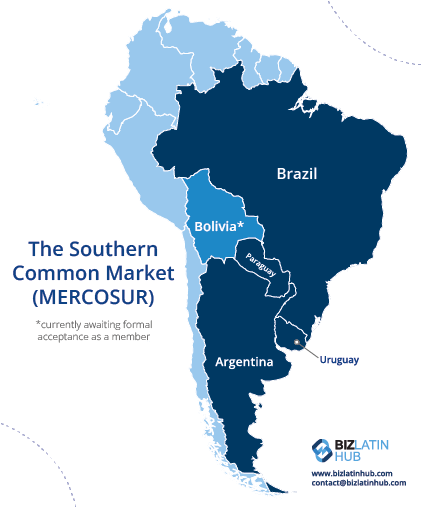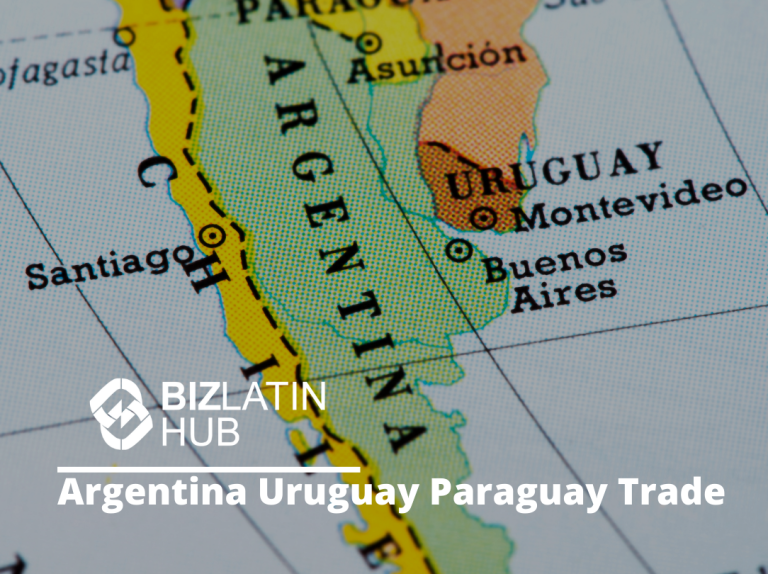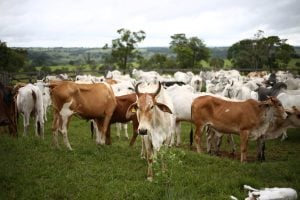Companies seeking to expand to Latin America should consider the commercial opportunities generated by trade agreements between Argentina, Uruguay and Paraguay.
As Latin American countries promote regional relationships to support each other, growth and free trade agreements offer new opportunities for business owners seeking to access important benefits and new markets abroad.
As one of the largest economies in Latin America, Argentina draws focus for foreign expanding companies. Expanding multinationals should pay attention to the close relationship Argentina maintains with neighboring countries, especially as these countries work to reduce bureaucratic barriers to doing business – such as the introduction of a new legal entity structure in Uruguay.
We provide a comprehensive overview of the trade agreements between Argentina, Paraguay and Uruguay. We also share some of the opportunities available to executives considering entering these markets.
Argentina-Uruguay-Paraguay trade relations and agreements
The economic relations between Argentina, Uruguay and Paraguay are comprehensive. Several different trade agreements in force between these nations reflect the efforts of their governments to maintain and strengthen trade ties.
However, in addition to strengthening relations with neighboring countries, each country has worked to diversify its trade profile not only within the region, but outside it with important trade partners in Europe and Asia.
Automotive trade deals
Argentina-Paraguay
In late 2019, the governments of Paraguay and Argentina signed their first free trade agreement for the automotive sector, which provides for the tariff reduction for practically all the cars that Argentina exports to Paraguay.
Paraguay currently markets around 40,000 units of new vehicles per year. Argentina exports more than 4,000 vehicles to the country and represents the seventh-largest export market for the automotive sector.
This agreement allows the export of pick-ups and light cars with zero tariffs. The cars with higher tariffs, such as passenger cars, will have an annual and automatic reduction schedule (2019: 25% 2020: 50% – 2021: 75% – 2022: 100%). In other words, by 2022 all vehicles will enter Paraguay without tariffs.
The agreement also includes regulations and benefits regarding the importation of used auto parts and vehicles from Argentina to Paraguay.
Uruguay-Argentina
In 2003, Uruguay and Argentina signed the Agreement on the conditions for bilateral trade for products of the automotive sector (AAP.CE No. 57). Like the agreement with Paraguay, automotive products will be marketed between the two countries without tariff rates, provided they meet origin requirements and the other conditions stipulated in the agreement.
It is important to highlight that this agreement will be applied until the MERCOSUR Automotive Policy comes into effect.
Strengthening Connectivity
In 2017, Argentina and Uruguay signed a Memorandum of Understanding for the implementation of the ‘Strengthening Connectivity’ (Fortalecimiento de la Conectividad) project.
This project is focused on improving communications between the countries. It aims to develop greater connectivity by creating fiber optic links to interconnection points where international internet providers are located, and to submarine cables that reach the Argentine coast.
Argentina and Urugugay’s Strengthening Connectivity project favors massive access to information and communication technology, generating sustainable and beneficial growth for the population of both countries.
Double taxation agreements
Uruguay maintains double taxation agreements with Argentina and Paraguay. These agreements prevent companies from receiving double taxation on the income obtained within the countries involved. Furthermore, some of these agreements also provide for the exchange of tax information.
Uruguay also has double taxation agreements with countries such as Spain, Sweden, Portugal, Mexico, India, Korea, Finland, Ecuador, among others. For foreign multinationals, these countries present attractive platforms to incorporate a company in Latin America, thanks to these double taxation deals and trade advantages.
Scientific cooperation agreements
In May 2018, Argentina and Uruguay signed a scientific cooperation treaty in Antarctica with the main purpose of promoting scientific exchanges between the two countries that have bases on the white continent, through scientific cooperation and exchanges, scientific research activities. and technological development.
Regional Business Groups
MERCOSUR
MERCOSUR is the most important and well-known trade agreement in Latin America. Argentina, Uruguay and Paraguay are founding members of this economic bloc.
According to the Council on Foreign Relations’ 2024 analysis, MERCOSUR represents the third largest integrated market in the world, with a total trade value reaching USD 46 billion in 2022. The economic contributions within the bloc are distributed as follows: Brazil accounts for 60% of the GDP, Argentina 30%, while Paraguay and Uruguay each contribute 5%.

The main objective of the block is to increase the efficiency and competitiveness of all the member economies by
- opening markets
- promoting economic development in the framework of a globalized world
- improving infrastructure and communications
- making the best use of available resources
- preserving the environment
- the generation of industrial complementation
- coordination of macroeconomic policies that benefit all its members.
MERCOSUR has free trade agreements with Mexico, Peru, India, Egypt, Israel and, more recently, with the European Union. For multinational traders interested in expanding to Latin America, Argentina, Uruguay and Paraguay’s trade relations are both regionally and globally diverse, offering reduced barriers to trade with important local and international partners.
Trade Performance and Economic Indicators
According to Paraguay’s Ministry of Economy’s May 2024 report, the country’s total trade reached USD 12 billion, with exports growing by 0.8% and imports increasing by 13.7%. Key exports include soy (USD 1.789 billion), electricity (USD 608 million), and soy flour (USD 348 million), while main imports consist of petroleum (USD 963 million), telephone devices (USD 785 million), and automobiles (USD 267 million).
The Economic Commission for Latin America and the Caribbean (ECLAC) reports that despite global challenges, intra-Mercosur trade has shown remarkable resilience with a 4.2% growth rate in 2024. This growth has been particularly driven by increased digital services trade between Brazil, Argentina, and Uruguay.
A significant development occurred in December 2024 when, according to Euronews, the EU-Mercosur trade agreement was finalized, creating a massive free trade area encompassing 780 million people. This landmark agreement is expected to substantially boost trade opportunities and economic cooperation between the two blocs.
Additionally, as reported by Digitalize Trade, eleven Latin American countries have initiated new customs cooperation programs in 2024, implementing innovative solutions such as cross-border blockchain technology for customs agencies to streamline trade processes.
ALADI
The Latin American Integration Association (ALADI) is a regional and international organization. Currently, ALADI has 13 member countries, including Argentina, Bolivia, Brazil, Chile, Colombia, Cuba, Ecuador, Mexico, Paraguay, Panama, Peru, Uruguay and Venezuela.
Like other member countries in ALADI, Argentina, Uruguay and Paraguay benefit from a preferential trading system that leans in favor of the relatively less economically developed countries. The special cooperation programs (pre-investment, business rounds, financing, technological support) support landlocked countries like Paraguay to achieve greater access and integration.
Business opportunities between Argentina, Uruguay and Paraguay
Farming
A study carried out by the Organization of Argentine Rural Confederations (CRA) showed that agriculture in Argentina is less competitive than in Uruguay, despite the advantage of generating higher yields.
For this reason, Argentine and foreign agriculture-focused firms have chosen to expand to Uruguay, generating a positive impact not only on the country’s economy but also on the dynamics of production, business culture, land tenure, and improvement in the country’s infrastructure.
Soybean, wheat, corn and beef crops, among others, are among the most common in the region.
Agricultural machinery
Paraguay is considered by Argentina as one of the main destinations for the Argentine agricultural machinery.
For foreign business owners interested in expanding to Latin America, the commercial relations between Argentina and Paraguay – especially in the agricultural sector – offer a significant advantage to doing business, as:
- Both countries have similar agricultural production systems
- Paraguay has a widespread use of direct sowing
- Paraguay has a significant area planted with traditional crops from Argentina (wheat, soybeans, corn)
- The proximity between Argentina and Paraguay reduces costs of offering after-sales services
- Quality requirements are more flexible than in other countries in the region
In figures, the main Argentine exports of agricultural machinery in 2018 were made to Brazil (34%), developed countries (28%) and finally to other Latin American countries, where the highest percentage corresponds to Paraguay, Uruguay and Bolivia (24%).
Tourism
In recent years, Uruguay has consolidated itself in the development of quality hotel infrastructure and tourist services, in addition to offering attractive natural conditions. These characteristics have contributed to Uruguay being the Latin American country that receives the most tourists in relation to its population.
One of the most important commercial relations between Uruguay and Argentina is related to tourism. For Uruguay, Argentine tourism is key, since it represents 56% of the external tourism they receive each year and 70% during the summer months.
The entry into force of the Tourism Law in 2015 generates tools to improve the productivity of the sector, providing opportunities for foreign tourism businesses. Although Argentine holidaymakers are an important target market for tourism in Uruguay, in recent years the country has managed to position itself as an important tourist destination to other markets, receiving a high flow of visitors from countries such as Brazil, Paraguay and the United States, among others.
Take advantage of Argentina, Uruguay and Paraguay trade relations
Take advantage of trade agreements between Argentina, Uruguay and Paraguay and enjoy the benefits of operating in a stable trading environment. When expanding to Latin America, these three countries must be on your radar. However, expanding to an unknown country or choosing the right country according to your needs requires understanding and compliance with all relevant corporate and trade regulations.
At Biz Latin Hub, our teams of bilingual legal and accounting experts operate across Argentina, Uruguay and Paraguay to support expanding multinationals. With over 5 years of experience in the region, we provide comprehensive market entry and back-office solutions including:
- Company formation and legal representation
- Trade compliance and customs advisory
- Market entry strategy development
- Accounting and tax services
- Due diligence and risk assessment
- Corporate legal services
Our local experts can help you navigate the complex trade relationships between these countries and ensure compliance with regional trade agreements and regulations. We stay current with the latest developments, including the December 2024 EU-Mercosur trade agreement and new regional customs cooperation initiatives, to provide you with strategic guidance for your business expansion.
Contact us today to learn how we can support your business expansion into Argentina, Uruguay and Paraguay.







